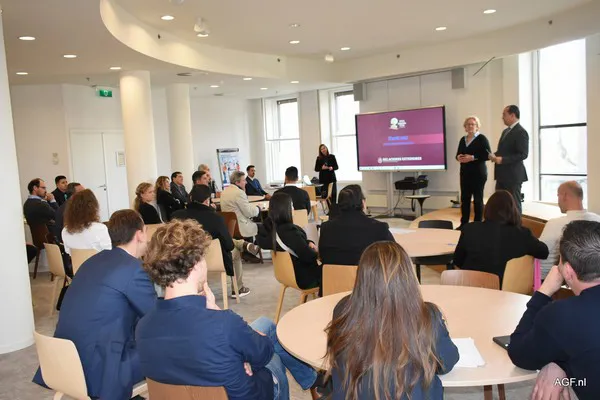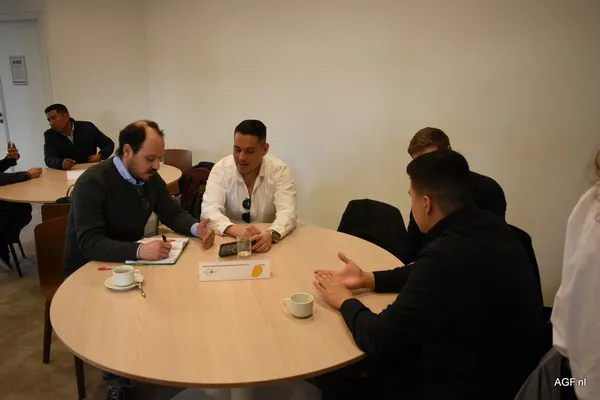The European market offers excellent potential for Mexican fruit. That became clear during the Mexican Business Forum, organized by United Producers of Mexico. At the Dutch Chamber of Commerce building, Mexican exporters, Dutch importers, and other interested parties met on Tuesday, February 6. "You often hear negative things about, for example, Mexican avocados," begins Mexican Ambassador to the Netherlands, José Antonio Zabalgoitia. "But a tremendous amount's being done in the area of sustainability."
Click here for the photo report of the Mexican Business Forum

European market
At the forum, representatives of Mexican growers' and export organizations shared many of these developments. These organizations are increasingly looking for opportunities to market their products in the European market. "Most Mexican products go to the North American market. But Europe, particularly the Netherlands, is also very interesting for our growers and exporters."
"It's crucial not to put your eggs in one basket. We've seen what impact losing an important sales market can have, which also makes diversifying Mexican product sales increasingly important. In this regard, the Netherlands is a destination country as well as a gateway to the rest of Europe. The port of Rotterdam is a hub for global trade, allowing 95% of lucrative markets to be reached within 24 hours. It could be a win-win situation for both sides," says Ambassador Zabalgoitia.
Mexican fruit, however, still gets a bit of a bad rap, he adds. "These more often have a negative reputation within Europe, but much is being done on sustainability and social impact in the agribusiness sector. However, it's difficult to get that message across. So with the help of Dutch representatives, we want to share Mexican fruit cultivation's many positive developments."

Sustainability
Thus, representatives from the Mexican mango association, the Jalisco avocado association, and a berry association took to the floor at the event. "It's vital to show that cultivation in Mexico is done sustainably, For instance, in 2002, EMEX launched a traceability program, in collaboration with the USDA and SAGARPA, to determine fruit's origin precisely," explains Eduardo Castillejos of EMEX, the national mango association.
"Also, together with the Northwestern University of Sonora, a master's student from Stockholm University, and a group of producers and exporters, we've collected crucial information on the daily measures implemented. That helps us plan and address sustainability and sustainable development. We want to use this to gather data about the environmental sustainability practices of the parties in Mexican mango production's global value chain's different links."
Armando Garcia Angulo of Apeajal, Jalisco's avocado association, discussed avocado cultivation's sustainability strategy. "We want to preserve Jalisco avocado production's environmental and social conditions while using avocado orchards to mitigate the effects of climate change. We do this through a reforestation program and our 'forest brigade' and 'forest nursery.'"
"We also share our knowledge about sustainable avocado cultivation at various events," adds Amarnado. Nohel Ernesto Guzman of Aneberries says water management, too, is critical for Mexican fruit farming. "We promote drip and precision irrigation systems to our growers to ensure as little water as possible is wasted." These are only some of the initiatives mentioned in the day's presentations.

Carlos Quintana of Hortimaq, Liquidseal's distributor in Mexico, got the last word. He explained that a lot is also being done to combat food waste during transportation from Mexico to Europe. "Liquidseal's solution improves products' shelf life, which is crucial during transport to Europe. It reduces food waste by 30%," he states.
After the formalities, exporters, and importers got the chance to meet. Tables were set out for conversations between interested parties. "All in all, a success," concludes Lia Bijnsdorp of United Producers of Mexico.
Click here for the photo report of the Mexican Business Forum
For more information: Lia Bijnsdorp
Lia Bijnsdorp
United Producers of Mexico
Tel: +31 (0) 103 041 001
Mob: +31 (0) 645 480 345
Email: lia.bijnsdorp@upmeurope.nl
Website: www.upmeurope.nl
